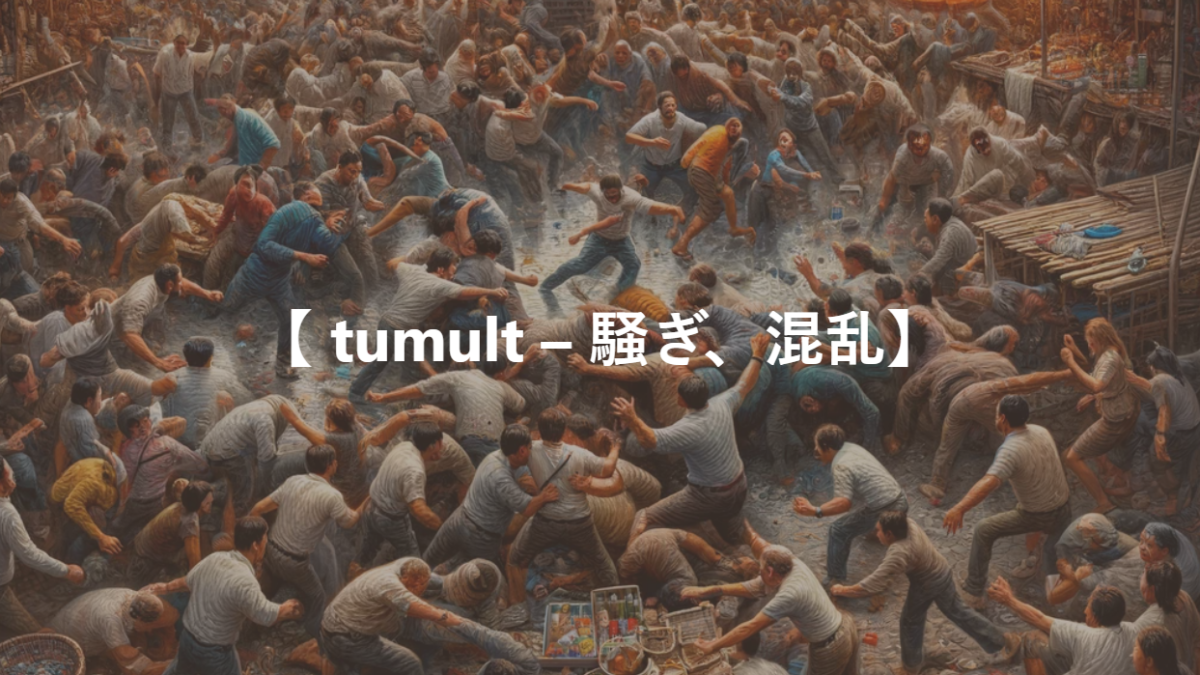語源・類義語・反対語・例文
【 tumult – 騒ぎ、混乱】という単語の語源とか由来を知っていますか?
「Tumult」という単語は、「騒ぎ」「混乱」という意味を持ち、大きな騒音や混乱、または大規模な社会的、感情的な動揺を指すのに使われます。この単語はラテン語の「tumultus」から来ており、これは「騒乱」「動揺」を意味します。「Tumultus」自体は、恐らく「tumēre」(腫れる、膨らむ)に由来し、何かが膨らんで制御不能になる様子を表す言葉として発展したと考えられます。この語源は、騒動や混乱が急に発生し、拡大する様子を言い表しています。中英語を通じて英語に取り入れられ、「tumult」は物理的な騒ぎだけでなく、感情的な動揺や社会的な混乱を指すのに用いられるようになりました。
The word “tumult” means “uproar” or “confusion,” and is used to describe significant noise or disorder, as well as large-scale social or emotional upheaval. This term originates from the Latin word “tumultus,” which means “disturbance” or “commotion.” “Tumultus” itself is likely derived from “tumēre,” meaning “to swell,” suggesting the development of the word to express something swelling and becoming uncontrollable. The etymology reflects the sudden onset and expansion of disorder or commotion. Through Middle English, the term was adopted into English, where “tumult” came to refer not only to physical uproar but also to emotional disturbance and social chaos.
この単語の類義語・反対語を教えてください。
類義語
- Uproar – 騒動
- Commotion – 騒ぎ
- Chaos – 混沌
- Disturbance – 混乱
- Pandemonium – 大混乱
- Riot – 暴動
- Turmoil – 騒乱
- Havoc – 大破壊
- Disorder – 無秩序
- Agitation – 動揺
反寧語
- Calm – 静けさ
- Peace – 平和
- Order – 秩序
- Tranquility – 静穏
- Harmony – 調和
- Stability – 安定
- Quiet – 静か
- Serenity – 平静
- Silence – 沈黙
- Rest – 休息
この単語に似た単語で間違いやすい単語はありますか?
- Turmoil: 「Turmoil」も「混乱」や「騒乱」を指しますが、しばしば内部の混乱や心の動揺を意味するのに対し、「Tumult」は物理的な騒ぎや社会的な混乱を指すことが多いです。
- Riot: 「Riot」は「暴動」と訳され、公共の秩序を乱す暴力的な集団行動を指します。「Tumult」とは似ていますが、「Riot」はより具体的に法律に反する集団的な暴力行為を意味します。
- Chaos: 「Chaos」は「混沌」と訳され、全くの無秩序や予測不可能な状態を指します。「Tumult」と同じく混乱を表しますが、「Chaos」はもっと広範で根本的な無秩序を示唆します。
- Uproar: 「Uproar」は「騒動」を意味し、「Tumult」と非常に近い意味を持ちます。しかし、「Uproar」は特に騒音や公衆の反応に焦点を当てることが多く、しばしば怒りや抗議の騒ぎを指します。
この単語を使った例文を5つほど教えてください。
The crowd outside the stadium grew into a tumult as the winning goal was scored.
(勝利のゴールが決まると、スタジアムの外の群衆は混乱状態になった。)
The protest march quickly turned into a tumult as clashes broke out between the demonstrators and the police.
(抗議行動の行進は、デモ参加者と警察との間で衝突が起きたことで急速に混乱した。)
The announcement of sudden layoffs caused a tumult among the employees, with many expressing their anger and fear.
(突然の解雇の発表は従業員たちの間で騒ぎを引き起こし、多くの人が怒りと恐怖を表明した。)
The political rally turned into a tumultuous event, with supporters and opponents clashing in a heated debate.
(政治集会は激しい議論で支持者と反対派がぶつかり合う激動のイベントとなった。)
The storm caused a tumult in the coastal town, with strong winds and heavy rain causing damage to buildings and disrupting daily life.
(嵐が沿岸の町で騒ぎを引き起こし、強風と大雨が建物に被害をもたらし、日常生活が混乱した。)
【 tumult – 騒ぎ、混乱】のコロケーション
- amidst the tumult – 騒動の最中に
- 何かが大きな騒ぎや混乱の中で起こっている状況を示します。混沌とした環境の中での行動や出来事を強調する際に用います。
- cause a tumult – 騒ぎを引き起こす
- ある行動や事件が大きな騒動や混乱を生じさせることを指します。原因となる行為やその結果に焦点を当てた表現です。
- rise above the tumult – 騒動を乗り越える
- 混乱や騒ぎの中でも、何かがそれを超えて成功するか、影響を受けずに進むことを意味します。困難な状況を克服する能力や強さを示す際に使われます。
- tumult of emotions – 感情の渦
- 個人が経験する激しい感情的な混乱や動揺を表します。感情が激しく揺れ動く状態を描写する際に用いられます。
- tumultuous response – 騒然とした反応
- 人々が何かに対して激しく、しばしば騒動を伴う形で反応する様子を示します。公衆の強い反響や騒動に富んだ反応を指します。
「Tumult」という単語は、「騒ぎ」「混乱」という意味を持ち、大規模な騒動や社会的、感情的な動揺を表すのに用いられます。ここで紹介した「tumult」のコロケーションは、この単語がどのような文脈で使われるかの具体的な例を示しています。
「Amidst the tumult」は、何かが大きな騒ぎや混乱の最中に起こっている状況を指し、混沌とした環境の中での行動や出来事を強調します。この表現は、騒動の中での立ち位置や行為を描写する際に特に有用です。
「Cause a tumult」は、ある行動や事件が大きな騒動や混乱を引き起こすことを意味し、原因と結果の関係を強調する際に使われます。これは、特定の出来事が周囲に与える影響の大きさを示すのに役立ちます。
「Rise above the tumult」は、混乱や騒ぎの中でも何かがそれを超えて成功するか、影響を受けずに進むことを表します。これは、困難な状況を克服する能力や精神的な強さを示す際に用いられます。
「Tumult of emotions」は、個人が経験する激しい感情的な混乱や動揺を指し、内面的な葛藤や感情の渦を描写するのに適しています。これは、人物の内面的な状態を深く掘り下げる際に有効な表現です。
「Tumultuous response」は、人々が何かに対して激しく、しばしば騒動を伴う形で反応する様子を示し、公衆の強い反響や情熱的な反応を描写する際に使用されます。
これらの「tumult」のコロケーションを通じて、「騒ぎ」「混乱」という単語がどのように多様なシナリオで表現されるかがわかります。特に動揺や混沌を伴う状況を描写する際に、「tumult」は非常に有用な単語です。
The word “tumult” means “uproar” or “confusion,” and is used to describe significant disturbances or social and emotional upheavals. The collocations of “tumult” introduced here provide specific examples of how this term can be applied in various contexts.
“Amidst the tumult” refers to a situation where something occurs amidst significant noise or disorder, highlighting actions or events within a chaotic environment. This expression is particularly useful for describing one’s position or actions amidst upheaval.
“Cause a tumult” means that a certain action or event causes a great disturbance or confusion, emphasizing the cause-and-effect relationship. It is helpful for illustrating the impact of specific events on the surroundings.
“Rise above the tumult” describes something overcoming or proceeding unaffected by the surrounding chaos or uproar. It is used to demonstrate the ability to overcome difficult situations or mental strength.
“Tumult of emotions” indicates intense emotional turmoil or agitation experienced by an individual, suitable for describing internal conflict or a whirlwind of emotions. This expression effectively delves into a person’s inner state.
“Tumultuous response” shows how people react strongly and often disruptively to something, used for depicting the public’s intense reaction or passionate response.
Through these collocations of “tumult,” it becomes clear how the term “uproar” or “confusion” is represented across different scenarios. Especially in depicting situations accompanied by disturbance or chaos, “tumult” proves to be an incredibly useful word.
tumultを使った文法問題
- The sudden announcement of the CEO’s resignation caused a _____ in the stock market.
- (A) tumults
- (B) tumult
- (C) tumultuous
- (D) tumultuously
解答と解説: (B) tumult
解説: cause a tumult で「混乱を引き起こす」という表現になります。tumultsは複数形、tumultuousは形容詞、tumultuouslyは副詞で、文意に合いません。
- The city was in a state of _____ after the earthquake, with buildings damaged and people displaced.
- (A) tumults
- (B) tumult
- (C) tumultuous
- (D) tumultuously
解答と解説: (B) tumult
解説: in a state of tumult で「混乱状態にある」という表現になります。tumultsは複数形、tumultuousは形容詞、tumultuouslyは副詞で、文意に合いません。
- The _____ crowd cheered as the winning team took the field.
- (A) tumults
- (B) tumult
- (C) tumultuous
- (D) tumultuously
解答と解説: (C) tumultuous
解説: 空欄には名詞crowdを修飾する形容詞が入ります。tumultuousは「騒がしい、混乱した」という意味の形容詞です。
- The political debate was _____, with both sides shouting and interrupting each other.
- (A) tumults
- (B) tumult
- (C) tumultuous
- (D) tumultuously
解答と解説: (C) tumultuous
解説: 空欄にはbe動詞(was)の補語となる形容詞が入ります。tumultuousは「騒がしい、混乱した」という意味の形容詞です。
- The storm raged _____, with strong winds and heavy rain causing widespread damage.
- (A) tumults
- (B) tumult
- (C) tumultuous
- (D) tumultuously
解答と解説: (D) tumultuously
解説: 空欄には動詞ragedを修飾する副詞が入ります。tumultuouslyは「騒々しく、激しく」という意味の副詞です。

